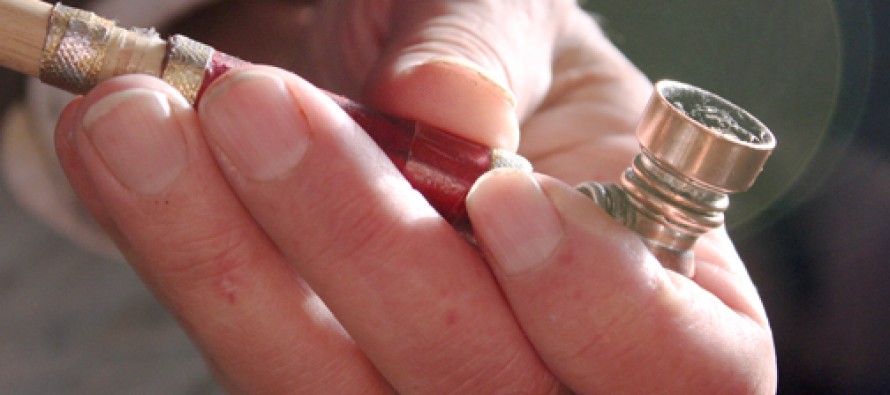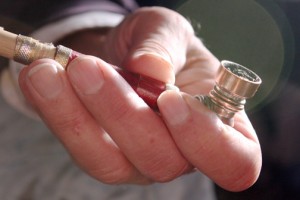Canadians still can’t consume cannabis


A local artist holds his marijuana pipe in his home Nov. 14. The man began medicating with marijuana after discontinuing opiate use to treat the symptoms of lupus, Hodgkin’s disease and severe scleroderma. Photo by/ Richard Dawes.
By Richard Dawes
Nov. 20, 2012
Colorado and Washington State have legalized the possession and sale of up to one ounce of marijuana for recreational use for people 21-years-of-age and older, but Canadians shouldn’t expect to see the sticky green bud for sale here anytime soon.
With 54 per cent of voters saying yes to Amendment 64 in one state, and 55 per cent saying yes to Initiative Measure No. 502 in the other, Nov. 6 marked the end of pot prohibition by state constitution for the first time in the United States. The Canadian federal government has no plans to visit the issue of decriminalization according to Essex Conservative MP Jeff Watson.
Amendment 64 is a change to the Colorado state constitution meaning that adults 21 or older can posses and purchase up to an ounce of marijuana from regulated retailers. Public use is still illegal but adults can grow up to six plants at home. Around 1.8 million people voted on the amendment according to the Colorado Secretary of State’s office.
I-502 is Washington’s movement to also legalize possession and sale of up to an ounce of marijuana for adults 21 and older. A new policy for “drugged driving” was set for the state as well.
Even though both initiatives passed at the state level, marijuana is still considered a schedule one drug that has high potential for abuse and no recognized medical use, according to the United States Drug Enforcement Administration. Therefore it is still considered prohibited by the US federal government.
As it stands, medicinal marijuana is permitted in Canada under specific guidelines. The Government of Canada website states “Health Canada does not advocate the legalization of marihuana. Marihuana remains an illegal and controlled substance, similar to other controlled products. Unlawful possession is a criminal offence.”
Specializing in addiction treatment in Windsor, the Erie St. Clair Clinic Centre of Excellence in Addiction Medicine helps people who are addicted to alcohol, opiates, stimulants, amphetamine and cocaine. Dr. Anthony Hammer said they rarely treat addiction to marijuana.
“The reason is that true (marijuana) addiction is very unusual. It does happen but it’s uncommon. In relation to legal drugs, nicotine, cigarettes and alcohol, it’s a relatively minor health hazard compared to those,” said Hammer.
Despite the lower hazard, Hammer still has issues with medicinal marijuana. He said the paperwork is a hassle.
“In general I don’t recommend it for pain management or nausea management because while I accept there are deserving cases for the purpose of which it has been approved, I really don’t want to spend my time sorting out the worthy cases from the people who are just looking for a substitute for their habit,” said Hammer. He has made only two exceptions to this in his entire career.
“If they are already my patients then fair enough, but there are so many people out there who I can’t tell if they’re looking for a genuine medical application of it or if they are just subsidizing a hobby,” Hammer said.
The reputation of medicinal marijuana in Windsor depends on the physician said Hammer. He doesn’t view marijuana as an effective way to treat patients because he said there are more efficient ways to treat the same symptoms already on the market. People have even told him that the marijuana product provided by the government is very low quality compared to what is grown in the Southern Ontario region.
The Canadian Alcohol and Drug Use Monitoring Survey is an ongoing study of alcohol and illicit drug use. A 2010 survey conducted with 13,615 respondents across 10 provinces reported 41.5 per cent have used marijuana at some point in their lifetime. If Canada was to consider legalization similar to the states, Hammer said he would expect an increase in the usage of the substance by the general population of about five-10 per cent.
“Is that a bad thing? I don’t know. Should we compare it to a five per cent increase in alcohol or cigarettes, it’s not significant in terms of the adverse health effects,” said Hammer.
Eligible medicinal marijuana patients make up two categories according to Health Canada. The first group’s use of marijuana is considered compassionate end-of-life care. Even if the patient must use oxygen or cannot inhale smoke, the dried plant can be heated and combined with butter or oils for consuming. The second group requires a specialist’s recommendation to obtain the drug along with a statement saying conventional treatments failed.
A Windsor artist fell into category number two when his doctor took him off opiates for pain relief and recommended him for medicinal marijuana. A painter by trade, life-like water color and oil paintings filled the walls of his front room top to bottom. The man, who wished to remain nameless due to his ongoing community contributions, has been using marijuana to treat the symptoms of lupus, Hodgkin’s disease and what he described as severe scleroderma. The combined symptoms of these three conditions include inflammation, swelling, joint pain and tissue damage caused by his immune system being unable to differentiate between healthy cells and damaged cells.
“I lived in a hospital for a long time and was under morphine drip,” he said. “In a hospital it’s bearable but taking morphine outside through pills, just plain hell. I found it to be another pain to suffer, believe it or not. First your stomach doesn’t work right, you can’t urinate. You feel like you’re made of cement.”
On his left was a desk. Tools such as paintbrushes, a metre stick and scissors were strewn across it. To his right a small grinder containing a few marijuana buds.
The man smokes nearly a gram of marijuana a day and said it makes it possible for him carry on with his life. He said using marijuana does not affect his memory, logic or speech patterns.
“I have to admit that marijuana does not take the pain away like morphine. But morphine takes everything away with it, even your judgment. What marijuana does do is it permits me to pay attention to something else which then makes the pain horizon. That’s my word for it. It permits me not to focus on the pain,” he said.
According to the RCMP, nearly two million marijuana plants were seized last year in Canada.


